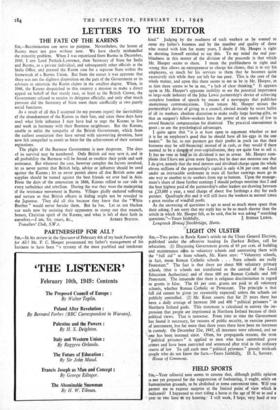PARTNERSHIP FOR ALL?
SIR,—In his review in the Spectator of February 4th of my book Partnership for All? Mr. F. C. Hooper pronounced my father's management of his business to have been "a tyranny of the most purblind and intolerant kind." Judging by the readiness of such workers as he wanted to enter my father's business and by the number and quality of those who stayed with him for many years, I doubt if Mr. Hooper is right in deeming himself entitled to say this. To my mind the real pur- blindness in this matter of the division of the proceeds is that which Mr. Hooper seems to share. I mean the purblindness to right and wrong that allows an.entrepreneur to charge his clients that is to say his employees, so much for his services to them that he becomes quite excessively rich while they are left far too poor. This is the core of the whole matter, and upon this there seems to me to be in Mr. Hooper, as to him there -seems to be in me, "a lack of clear thinking." It appears again in Mr. Hooper's apparent inability to see the potential importance to large-scale industry of the John Lewis partnership's device of achieving complete freedom of speech by means of a newspaper that publishes anonymous communications. Upon tenure Mr. Hooper misses the partnership's device of giving to a council, elected mainly by secret ballot of all its workers, absolute discretion to make really large leaving-gifts, so that an outgoer's fellow-workers have the power of the courts of law to award financial compensation for dismissal. The practical convenience is great ; so are the psychological advantages.
I quite agree that " it is at least open to argument whether or not it is for an employee's good that he should have all his eggs in the one basket." So far, as our partners get their profits in pock (so that their business may be self-financing) instead of in cash, as they would if there seemed to be a danggrof over-capitalisation, they are quite free to sell it. It has no vote so loiiras its dividend is not in arrear. Mr. Hooper com- plains that I have not given more figures,- but he does not mention one that I do give, namely that the total interest and dividend-charge upon the whole eleven millions of the partnership's capital is only 4.36 per cent. and that under an irrevocable settlement in trust all further earnings must go in one way or another to its workers from top to bottom. Upon the manage- ment's share of those further earnings I should perhaps mention that I and the four highest paid of the partnership's other leaders are drawing between us £23,000 a year, a total charge of about five farthings a day for each partner. Quadruple this and it will still leave the Workers in normal limes a great residue of windfall profit.
As the answering of questions is apt to need so much more space than their asking, I am sorry that my reply has to be so much shorter than the article in which Mr. Hooper felt, as he said, that he was asking "searching
questions."—Yours faithfully, J. SFEDAN LEWIS. Longstock Hotiset Stockbridge, Hants.






































 Previous page
Previous page